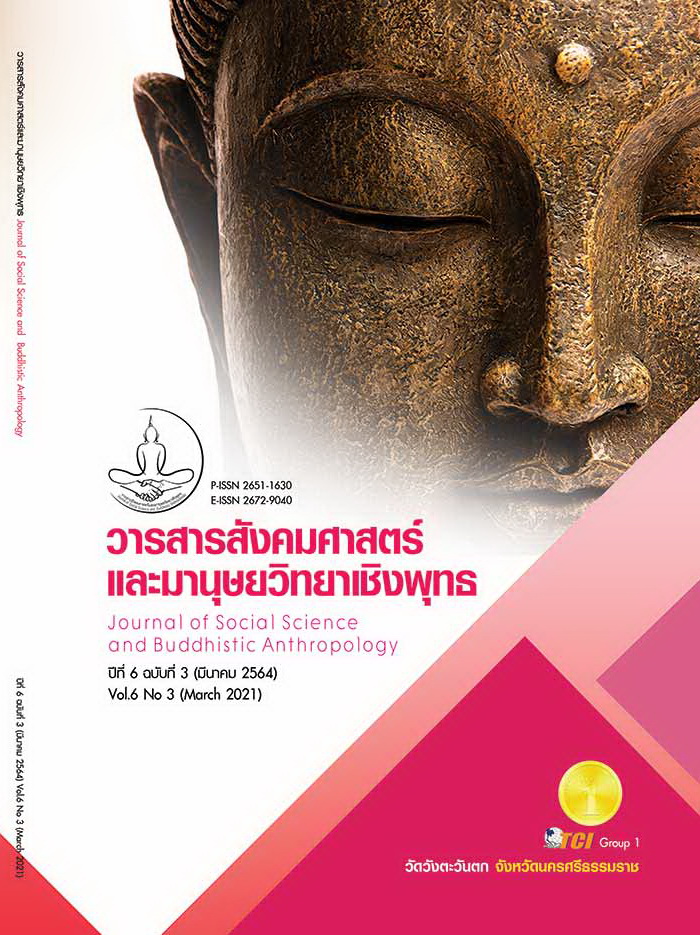DEVELOPMENT OF A LITERATURE CURRICULUM FOR ENHANCING EMPATHY OF LOWER SECONDARY STUDENTS
Keywords:
Literature curriculum, Enhanced empathy, Lower secondary school studentsAbstract
The Objectives of this research article were to 1) develop empathy characteristics among lower secondary school students; 2) to develop a literature curriculum to enhance empathy characteristics among lower secondary school students; and 3) to study the effectiveness of the literature curriculum to enhance the empathy characteristics. The research design was research and development (R&D), which was divided into the following three phases: Phase I: the researcher synthesized theoretical frameworks and interviewed the experts in the fields. The results showed that there were three characteristics of empathy characteristics among lower secondary school students, which included: 1) understanding the feelings and behavior of others; 2) consideration; and 3) appropriate responses. Phase II: the researcher developed the curriculum from Social Constructivism by adapting the Literature Circle approach, Transformative Learning, and Empirical Learning for Literacy and then conducting the pilot study. The results demonstrated that the curriculum was comprised of four units, based on genre, such as movies, short stories, novels, and poetry. There were four learning procedures in each unit. They were 1) specifying learning objectives according to the interests of students; 2) studying literature through the use of the Literature Circle; 3) applying and connecting to lessons learned for new situations; and 4) reflective practice and learning evaluation. Phase III: the researcher utilized the curriculum with the sample group of 26 students in order to evaluate the effectiveness of the curriculum by using Repeated - measure ANOVA. It was found that the development of enhanced empathy increased during the course significantly at .05. The were different average values from using Repeated-measure at least twice. (F = 132. 132, df = 2.245, 56.134, p = .00)
References
กองบรรณาธิการ The Standard Team. (2561). เด็กรังแกกันไม่ใช่เรื่องเล็ก ย้อนดูสถิติพบไทยติดอันดับ 2 เด็กรังแกกันในโรงเรียน มีเหยื่อปีละ 6 แสนคน. เรียกใช้เมื่อ 31 มกราคม 2561 จาก https://thestandard.co/bullying-at-school/
ทัศนีย์ สุริยะไชย. (2554). ความสัมพันธ์ระหว่างการตระหนักรู้ในตนเองกับการร่วมรู้สึกในวัยรุ่น. ใน สารนิพนธ์การศึกษามหาบัณฑิต สาขาจิตวิทยาพัฒนาการ. มหาวิทยาลัยศรีนครินทรวิโรฒ.
พรรณรอง รัตนไชย. (2555). สภาพ ปัญหาและการนำเสนอแนวทางการพัฒนาการจัดการเรียนการสอน วรรณคดีและวรรณกรรม ในโรงเรียนสังกัดสำนักงานเขตพื้นที่การศึกษามัธยมศึกษา เขต 16. ใน วิทยานิพนธ์ครุศาตรมหาบัณฑิต สาขาการสอนภาษาไทย. จุฬาลงกรณ์มหาวิทยาลัย.
มนตรี อินตา. (2562). SOFT SKILLS: ทักษะที่จำเป็นสู่ความเป็นมืออาชีพของครูยุคใหม่. วารสารวิชาการศึกษาศาสตร์, 20(1), 153-167.
รัชนีวรรณ วณิชย์ถนอม. (2548). การปรับใช้สมรรถนะในการบริหารทรัพยากรมนุษย์. วารสารข้าราชการ, 50(2), 10-24.
รื่นฤทัย สัจจพันธุ์. (2549). สุนทรียรสแห่งวรรณคดี. กรุงเทพมหานคร: ณ เพชร สํานักพิมพ์.
วิไลลักษณ์ พงษ์โสภา. (2555). สุขวิทยาจิต. กรุงเทพมหานคร: จุฬาลงกรณ์มหาวิทยาลัย.
ศรีเรือน แก้วกังวาล. (2540). จิตวิทยาพัฒนาการชีวิตทุกช่วงวัย (เล่ม 2) วัยรุ่น-วัยสูงอายุ. กรุงเทพมหานคร: มหาวิทยาลัยธรรมศาสตร์.
สำนักงานเลขาธิการสภาการศึกษา. (2556). แนวทางการแก้ปัญหาความรุนแรงในสถานศึกษา. กรุงเทพมหานคร: พริกหวานกราฟฟิค.
สำนักงานส่งเสริมสังคมแห่งการเรียนรู้และคุณภาพเยาวชน. (2557). ปลุกการสอนให้มีชีวิตสู่ห้องเรียนในศตวรรษใหม่. ใน เอกสารประกอบการประชุมวิชาการ “อภิวัฒน์การเรียนรู้...สู่จุดเปลี่ยนประเทศไทย”. สำนักงานส่งเสริมสังคมแห่งการเรียนรู้และคุณภาพเยาวชน.
สิทธา พินิจภูวดล และนิตยา กาญจนวรรณ. (2520). ความรู้ทั่วไปทางวรรณกรรมไทย. กรุงเทพมหานคร: ดวงกมล.
สุพาพร เทพยสุวรรณ. (2651). ทำยังไงจะรู้จักรู้ใจลูกวัยรุ่น. เรียกใช้เมื่อ 20 ตุลาคม 2561 จาก https://mgronline.com/qol/detail/9610000100087.
Blasco, P.G & Moreto, G. (2012). Teaching Empathy through Movies: Reaching Learners Affective Domain in Medical Education. Journal of Education and Learning, 1(1), 22-34.
Chen, L. L. (2016). Impacts of flipped classroom in high school health education. Journal of Educational Technology Systems, 44(4), 411–420.
Dogan, B., & Kaya-Tosun, D. (2020). An effective method in improving social skills: Literature circles. International. Journal of Educational Methodology, 6(1), 199-206.
Eaglestone, R. (2019). Literature: Why It Matters. Cambridge: Polity Press.
Fisher, D. B. et al. (2016). Visible Learning for Literacy, Grades K-12: Implementing the Practices That Work Best to Accelerate Student Learning. California: Corwin Publishers.
Hodges, G. C. (2010). Reasons for reading: why literature matters. Literacy, 44(2), 60 - 68.
Perry, M.S. (2019). Literature for the Twenty-first Century: Developing Multimodality and Entrepreneurial Skills through Literature-Based Assessments. Kritika Kultura, 33(5), 428 - 454.
Taylor, E. W. (2009). Fostering transformative learning Transformative learning in practice. San Francisco: Jossey-Bass.
World Health Organization. (1997). Life Skill Education for Children and Adolescents in Schools. Switzerland: Programme on Mental Health.









